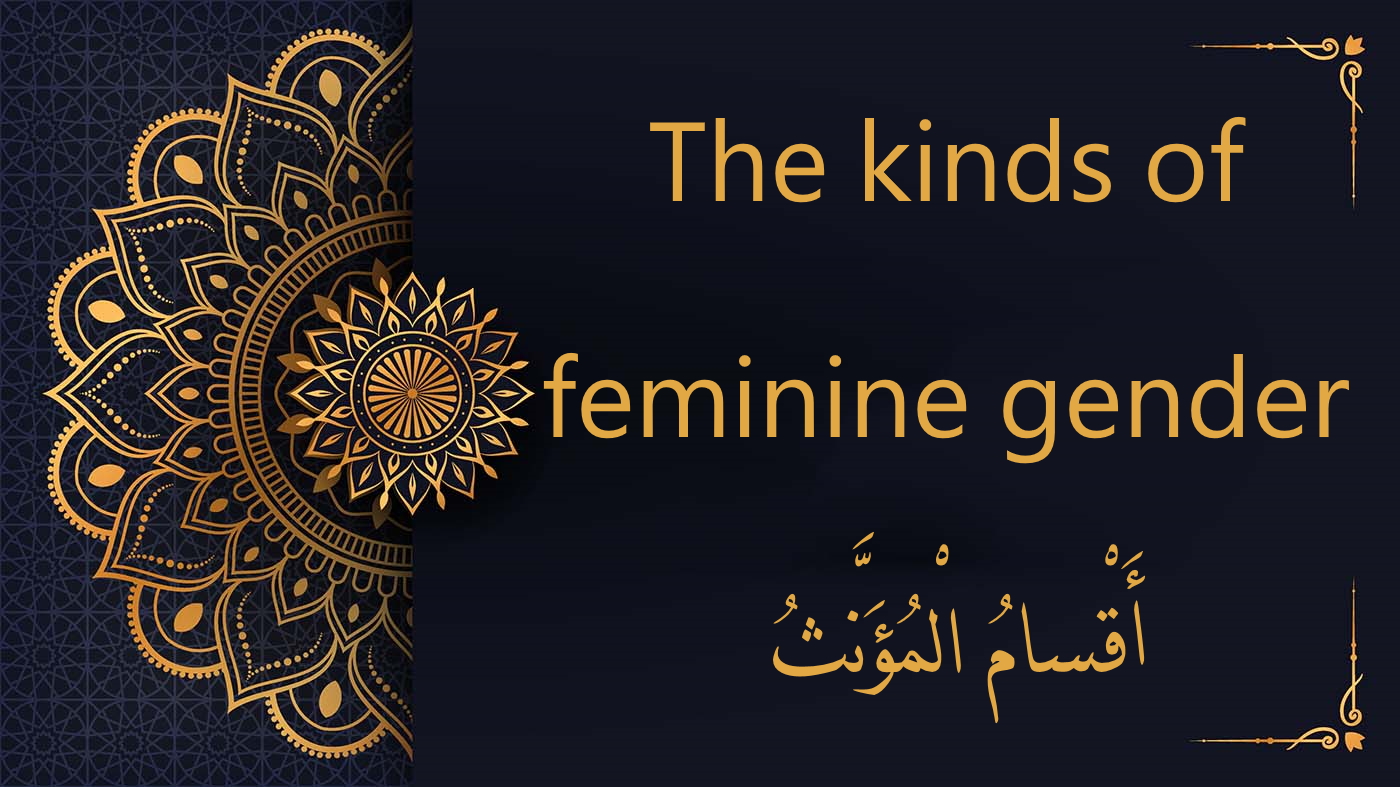
In Arabic, there are two primary genders: masculine (المُذَكَّرُ) and feminine (الْمُؤَنَّثُ). Outside of specific feminine categories, words generally default to the masculine form.
Examples:
وَقَالَتِ امْرَأَتُ فِرْعَوْنَ قُرَّتُ عَيْنٍ لِّي وَلَكَ
And the wife of Pharaoh said, “[He will be] a comfort of the eye for me and for you. (28:9)
وَأَوْحَيْنَا إِلَىٰ أُمِّ مُوسَىٰ أَنْ أَرْضِعِيهِ
And We inspired the mother of Moses, “Suckle him (28:7)
Examples:
وَيَوْمَ نَبْعَثُ مِن كُلِّ أُمَّةٍ شَهِيدًا
And [mention] the Day when We will resurrect from every nation a witness. (16:84)
وَإِذَا الْجَنَّةُ أُزْلِفَتْ
And when Paradise is brought near, (81:13)
Feminine nouns can be derived by adding the suffix ة (ta marboota) to their masculine counterparts. This change transforms the meaning or context to the feminine form, as demonstrated below:
مُسْلِمٌ (Muslim) becomes مُسْلِمَةٌ (Muslim woman).
اِبْنٌ (son/boy) becomes اِبْنَةٌ (daughter/girl).
كَبِيرٌ (big, for masculine) becomes كَبِيْرَةٌ (big, for feminine).
لَيْلٌ (night, in a masculine context) becomes لَيْلَةٌ (night, in a feminine context).
إِنَّا أَنزَلْنَاهُ فِي لَيْلَةِ الْقَدْرِ
Indeed, We sent the Qur’an down during the Night of Decree. (97:1)
وَإِنَّهَا لَكَبِيرَةٌ إِلَّا عَلَى الْخَاشِعِينَ
it is difficult except for the humbly submissive [to Allah] (2:45)
While many words ending in ة (ta marboota) are typically feminine, there are exceptions where words with this ending are considered masculine. For instance:
إِنِّي جَاعِلٌ فِي الْأَرْضِ خَلِيفَةً
“Indeed, I will make upon the earth a successive authority.” (2:30)
Examples:
وَإِذَا السَّمَاءُ كُشِطَتْ
And when the sky is stripped away (81:11)
قَالَ إِنَّهُ يَقُولُ إِنَّهَا بَقَرَةٌ صَفْرَاءُ فَاقِعٌ لَّوْنُهَا تَسُرُّ النَّاظِرِينَ
He said, “He says, ‘It is a yellow cow, bright in colour – pleasing to the observers. (2:69)
While many words in Arabic that end with اء (alif maqsura) might be assumed to be feminine due to their structure, there are exceptions that are considered masculine.
For instance:
وَادْعُوا شُهَدَاءَكُم مِّن دُونِ اللَّـهِ إِن كُنتُمْ صَادِقِينَ
and call upon your witnesses other than Allah, if you should be truthful. (2:23)
إِنَّمَا الصَّدَقَاتُ لِلْفُقَرَاءِ وَالْمَسَاكِينِ
Zakah expenditures are only for the poor and for the needy (9:60)
Examples:
فَلَمَّا ذَهَبَ عَنْ إِبْرَاهِيمَ الرَّوْعُ وَجَاءَتْهُ الْبُشْرَىٰ يُجَادِلُنَا فِي قَوْمِ لُوطٍ
And when the fright had left Abraham, and the good tidings had reached him, he began to argue with Us concerning the people of Lot. (11:74)
Certain nouns in Arabic are treated as feminine by convention, even if they don’t have the typical markers of feminine nouns. Notably, many geographical names, including those of towns, villages, and countries, fall into this category.
For example:
وَقَالَ الَّذِي اشْتَرَاهُ مِن مِّصْرَ لِامْرَأَتِهِ
And the one from Egypt who bought him said to his wife (12:21)
غُلِبَتِ الرُّومُ
The Byzantines have been defeated (30:2)
Certain nouns referring to paired body parts are treated as feminine in Arabic, despite not having the typical markers of feminine nouns. Some examples include:
Names referring to types or descriptions of fire in Arabic are traditionally treated as feminine. Notable examples include:
وَلَا تُسْأَلُ عَنْ أَصْحَابِ الْجَحِيمِ
and you will not be asked about the companions of Hellfire. (2:119)
سَأُصْلِيهِ سَقَرَ
I will drive him into Saqar. (74:26)
Names referring to types or characteristics of wind in Arabic are typically considered feminine. Examples include:
فَأَرْسَلْنَا عَلَيْهِمْ رِيحًا صَرْصَرًا فِي أَيَّامٍ نَّحِسَاتٍ
So We sent upon them a screaming wind during days of misfortune (41:16)
أَعْمَالُهُمْ كَرَمَادٍ اشْتَدَّتْ بِهِ الرِّيحُ فِي يَوْمٍ عَاصِفٍ
their deeds are like ashes which the wind blows forcefully on a stormy day (14:18)
In Arabic, certain nouns, despite not necessarily having the typical feminine markers, are treated as feminine. Examples of these include:
أَرْضٌ (Arth) – Earthشَمْسٌ (Shams) – Sun
نَفْسٌ (Nafs) – Self or soul
خَمْرٌ (Khamr) – Wine or alcoholic beverage
بِئْرٌ (Bir) – Well (for water)
دَارٌ (Dar) – Home or abode
نَارٌ (Nar) – Fire
وَالشَّمْسِ وَضُحَاهَا
By the sun and its brightness (91:1)
نَارٌ حَامِيَةٌ
It is a Fire, intensely hot. (101:11)
إِذَا زُلْزِلَتِ الْأَرْضُ زِلْزَالَهَا
When the earth is shaken with its [final] earthquake (99:1)
وَلَا أُقْسِمُ بِالنَّفْسِ اللَّوَّامَةِ
And I swear by the reproaching soul [to the certainty of resurrection]. (75:2)
This lesson on Arabic nuances concludes here. Insha’Allah, our subsequent session will delve into the conditional sentences in Arabic.
Al-dirassa Institute invites you on a linguistic journey with our expert teachers to master the Arabic language. Should you wish to further your studies, we welcome your inquiries.
Discover the experiences of our delighted clients who have thoroughly enjoyed utilizing this standout feature.
Alhamdulillah I‘m very pleased with the arabic and Qur’an lessons I receive from teacher Umm Tasneem and I‘m also content with the al-dirassa administration team who were very quick in answering any questions I had. In a month I progressed a lot and I cannot wait to continue my studies with al-dirassa. May Allah reward everyone at al-dirassa.
Verified review - view original
My Qur’an teacher is fantastic, she teaches me in a loving and kind way where I look forward to the lessons and learn so much. My Arabic teacher is equally as nice and has a lot of patience with me, she has great expertise in the field and I’ve progressed really quickly with her. Thank you Al-dirassa!
Verified review - view original
Don’t want to go through the translation anymore?
30 free minutes with your qualified Egyptian teacher.

Al-dirassa Institute offers you a gift to help you begin your journey to being fluent in Arabic and learning the Quran.

Al-dirassa Institute offers you a gift to help you begin your journey to being fluent in Arabic and learning the Quran.